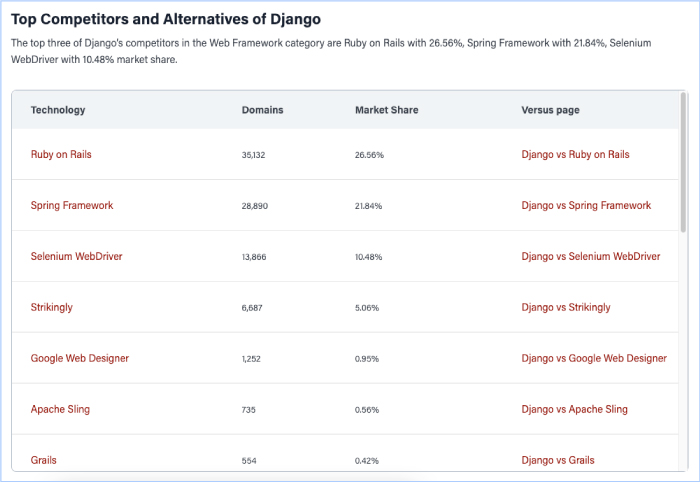If you are considering developing and deploying a new web app in 2024, build an app on Django Python. Period.
Why? It’s because this top web framework could help you build a web app in half the time as opposed to other web frameworks.
How could this be possible? Continue reading to understand what the Django Framework brings to the table regarding speed, security, and SEO for web apps.
How Does Django Help You Build a Powerful Web App In a Fraction of the Time?
Django Python comes powered with a "batteries-included" feature (more on this in a minute), not to mention it uses a series of packages, plugins, and more that help you build a robust app quickly.
So, it is no surprise that Django is ranked first among the most popular web development frameworks in 2023, with almost 43,502 companies using it worldwide and 46.90% of the companies in the U.S. alone using it.


Django Python is Python's top web development framework, with 40% of the 8 million Python developers using it.
Come to think of it, the framework has been a saving grace for web developers tired of rewriting codes from scratch, which is a chief documented issue for every new project undertaken.
Before we dive deep into Django features, first, a word on Web App Development Challenges.
Current Challenges In Web App Development
If you look at the current Web development scenario, it’s fraught with loads of challenges.
Reinventing the wheel: With other frameworks, you must repeatedly reinvent the wheel with every project. As in, you’ll have to build features from scratch and rewrite codes for those over and over again, not to mention other drawbacks such as backend complexities and API integration, among other things.
Security: Building secure web applications is complex and time-consuming because, in most frameworks, security features must be manually installed.
Scalability: Web applications crash when there’s a sudden spike in web traffic as they don’t have scalable web architecture.
Code Maintainability: Large apps tend to have intricate codes that are difficult to read and maintain.
These and many other issues affect web app development and stand in the way of speedier development. Enter Django Python, which addresses the above challenges with effortless ease.
What is Django Python?
Django is Python’s i)high-performing, ii) free and open-source framework for developing complex web applications - a good enough reason for Python developers to flock to Django more than any other web framework or even other Python frameworks.
The battery-induced feature we discussed before is nothing but the pre-loaded (ready-made) features that this framework comes packed with, making it conducive to writing unique apps.
Thus, developers can stop wasting time developing things from scratch.
In short, the framework takes all the heavy lifting and hassle out of web app development.
So, it is no surprise that the world’s largest websites, including Instagram, Mozilla, and NASA, are built on it; for that matter, even startups have taken a liking for it.
That’s just a brief take on the Django Python framework. Read on to learn how this framework’s features cut the development time by half.
Why Django Framework is a Good Bet for Speedy Web Application Development
If web application development is on your mind, doubling down on the Django framework should be your only option. Here are 11 compelling reasons why Django Python should be your go-to framework.

1. Django Pairs Well With Python
Django, on its own, has no individuality or presence. However, when it joins forces with Python, magic happens.
For starters, Django stands on the shoulders of Python - a high-performing, highly versatile programming language with an influential role in multiple programming languages and, therefore, is well-liked by developers.
By far, there isn’t any programming language out there that could perform all programming tasks and solve problems; however, Python is good enough, which makes it an excellent choice for developers.
It’s touted as one of the most popular programming languages in 2023, followed by JavaScript, Java, and C/++.
Python Programming Language bets on
Third-party modules: Python boasts of third-party modules and colossal libraries, which can aid and extend the functionality of different tasks.
Large and active community base: Python’s backbone is its growing community base, nearly 15.7 million Python developers, who not only contribute to developing this popular programming language but gladly lend a helping hand when it comes to fixing bugs and more.
Intuitive Data Structures: Another plus point of Python is its highly intuitive and easy-to-use data structures that aid processing, manipulation, visualization, and management.
Easy to learn: Python syntax seems similar to English, making it every beginner’s cup of tea. Sure enough, not just beginners but even pros can gain from its easy-to-use syntax.
Portable: Python code can be ported across several operating systems, such as Windows, macOS, Linux, and other operating systems, facilitating real-time code implementation and testing.
Perfect for Prototypes: Python’s short syntax enables developers to create prototype applications with less code and less effort.
Easy Generation of APIs - Another critical feature of Django is the Representational State Transfer (REST) framework - a full-fledged toolkit for building web APIs. Django’s REST helps build ready-to-use API in just three lines of code.
These and other benefits of seamless text processing and easy code debugging and development make Python and Django a showstopper combo in web application development.
2. Django is Well-Documented - 4,50,000 Words and Counting
Imagine you got stuck while writing an application code for a Django project.
No problem!
Look into Django docs, and you will find a solution.
It turns out that Django developers have compiled high-quality documentation comprising a whopping 4,50,000 words and more, not only to aid seasoned developers when they get stuck but to orient beginners as well. More importantly, the documentation process is ongoing at Django Labs as it aims to cover all the latest updates and more to keep the developers at top speed on the newest features and best practices.
Meaning if you are looking for the latest code or something, be assured you'll find it in this updated documentation; however, you'll have to show some patience while searching it, given the gargantuan size of the documentation.
One way to quickly locate the code is to start with the Index or the default search feature. And given that the documentation is divided in silos, that's if you are lucky, tracking down the code would be a cinch.
Other standout features of the document include the introduction, which is beginner-friendly for Django and web application developers. However, it's not in-depth but good enough to whet the appetite of web development beginners.
And, yes, there are topic guides that take you through a complete Django development journey. For instance, there are comprehensive guides on the Django model system, forms frameworks, and template engine, among many others.
Additional Key Features of Django Documentation
Tutorials and examples: Besides explaining concepts, the documentation even encapsulates tutorials and examples for easier understanding and implementation of complex ideas.
Community Contribution: Django has a thriving community of volunteers who help identify and fix errors in the documentation, add missing information, improve existing content, translate documentation, and so on.
Available in Multiple Languages: The document is accessible worldwide as it's available in multiple language formats.
So, if you think the Bible is the most-read book in the world, think again. Just kidding! Django’s documentation is the lifeline of developers along with its Batteries-Included approach. What’s that approach? Read on!
Python pairing with Django is just one thing that accelerates the web app development process. Even Django documents help. Here’s how.
3. Django Follows Batteries-Included Philosophy
Tailoring a full-fledged application in the shortest possible time is easiest on Django Python because the framework follows the "batteries included" approach. Put another way, the framework comes pre-baked with a comprehensive set of tools and libraries such as URL routing, form handling, authentication, and so on, which enables developers to build their groundwork faster and thus spend more time developing the core functionalities.
On top of that, the framework is powered with 4,000+ packages to help you scale up and deal with various complex application features if required. The package is designed to handle the app's testing, debugging, and profiling requirements.
Further, Django Python facilitates the app's setting up and use of data analysis, AI, and machine learning.

Apart from the Batteries-included approach, Django also boasts of an in-built authentication system. Is that a crucial feature? Yes! Here’s how this feature saves time and effort for Django developers.
4. Django has an In-Built Authentication System
Django has tools and functionalities that help developers handle user authentication, permissions, and sessions directly within the web app. In other words, by writing a few lines of code, you can add user logins, logouts, passwords, and additional registration and security features within the Django project.
The built-in authentication system enables website owners to provide access to their site pages only to logged-in users and not to an unverified person. By doing so, sensitive information or personalized features can be used/seen by only those authorized to see them.
The built-in authentication system saves time and effort and, more importantly, offers a secure way to manage user accounts without losing ownership control.
Along with its in-built authentication system, Django bets on the DRY principle for speed and code maintainability.
5. Django Follows the DRY principle
Granted, this point should have been covered up front, given that the DRY principle is an indispensable part of the Django Python development process, but then, better late than never.
Django leverages the DRY “Don’t Repeat Yourself” principle - a software development principle that aims at code re-usage and reducing duplicity.
Code re-usage reduces development time and effort, enabling developers to focus on developing core features and functionalities. Plus, such codes are easier to maintain, and when it comes to updating, changes have to be made only in a single location to be replicated in the entire codebase.
Also, DRY code is easier to understand, helping developers quickly grasp the overall code structure.
Along with the Batteries-included approach, in-built authentication system, and DRY principle, Django also boasts two more battle-tested features, such as Operation Relational Mapping (ORM) and multi-level caching mechanisms, to boost the development process further.
6. Django Accommodates Spikes in Traffic and Data Volume
Django’s philosophy pivots around the user. So, Django easily accommodates those requirements if there’s a sudden spike in traffic in your app and data volume. For one, Django uses different caching techniques at several levels in the application stack to reduce the server load and improve performance. Developers can cache entire views, portions of templates, and even query results. The regular caching of data cuts down the need for repetitive processing, bettering the response time and reducing the load on the server.
Additionally, Django’s ORM optimizes database queries, thus cutting down the query execution time and database load.
Also, when the traffic loads increase in the application, Django enables load distribution across multiple servers. Due to this feature, no single server is overwhelmed, ensuring consistent performance despite traffic surges.
For tasks that don’t call for immediate response, Django pushes them to asynchronous task queues and schedulers. This ensures that primary threads remain responsive, prompting better efficiency and scalability of concurrent tasks.
Django also supports vertical and horizontal scaling to meet evolving user demands. Vertical scaling allows adding more resources to a single server, while horizontal scaling adds more servers.
Beyond managing spikes in traffic, Django is extensible and customizable, making it an apt framework for various industries.
7. Django is Extensible and Customizable
Sure enough, Django Python provides all the nuts and bolts for crafting robust web apps; however, if further customization is on your mind, this web framework is all for it. Simply put, developers can extend its functionalities as much as they want to meet client requirements.
How? For one, it has a massive lineup of third-party libraries and frameworks, making it much, much easier to add functionalities and tools. Another is Django's plugins, which allow developers to extend their framework without changing the core code. Bottomline: Adding new features, modifying existing user behavior, and even integrating third-party extensions are possible with Django plugins.
Further, this finest web framework can be used to build an array of applications in diverse fields. From web apps for eCommerce websites, social networking platforms, and content management systems to Data-driven applications, Django has got all that and some to be an all-rounder web framework for all industry types.

Furthermore, Django is connected to several top databases, such as MySQL, PostgreSQL, and SQLite. Django's ORM enables writing codes that interact with your database. This means you don't have to write raw SQL queries, which could be complex and error-ridden.
What's more, the admin interface can be customized for project-specific functionalities, too.
In addition to the above features that help you roll out your web app to the market faster, Django’s speed as a web framework can also be attributed to its huge collection of plugins.
8. Django Offers a Plethora of Plugins
Django plugins help speed up the web app development process. Django users can install and configure third-party Django applications by searching for the same on Github and DjangoPackages.org.
Some commonly used Django plugins include authentication and authorization, admin interface extensions, ORM enhancement packages, REST frameworks, ecommerce and CMS solutions, and more.
The host of features discussed above ensures that Django is a good bet for speedy web app development. That said, there are other features as well that make Django the much-favored framework among businesses.
9. Django is Secure
If you are trying to build a web app from the ground up, there is a one percent chance of phishing attacks, thus putting your web app in harm's way. With Django Python, you don't have to worry about any malware attacks. More so because Django packages come fortified with built-in security features such as SQL injections, clickjacking, XSS attacks, CSRF attacks, email header injection, cryptography, and more. Moreover, its growing community of web developers consistently reviews the codes, and there are constant security updates and compliance with best security practices, which ensures robust defense mechanisms for web apps.
Additionally, there's extensive documentation and community resources on secure coding techniques.
10. Django Supports SEO
Django pairs with SEO well. Here are some excellent reasons why this framework suits SEO.
Django creates a clean, semantic HTML code that works well with search engines. Put another way, the code structure is such that search engines can quickly identify the website's content and context.
Another crucial feature is URL routing, which enables developers to create descriptive, keyword-rich URLs that resonate with users and search engines and, in the process, make the site crawlable.
Also, it comes with built-in tools and libraries of the framework that help create sitemaps and robots.txt files to notify search engines of the website's structure and content hierarchy, in addition to metadata elements, such as page titles, descriptions, and meta tags, which are crucial for better search engine results.
Further, it's armed with compatible SEO plugins, extensions, and even canonical URLs- which means it notifies search engines about the preferred webpage version to Google to avoid content duplication. Moreover, the framework has tools and configurations that improve website speed and advocate mobile-friendliness, which is crucial as Google prioritizes mobile-optimized websites.
Long story short, Django's compatibility with SEO tools makes it an ideal choice for developing SEO-friendly websites that rank well in search engines.
11. Django is Mature and Stable
Django has been around for almost two decades, first released in 2005, which significantly vouches for its maturity and stability.
Over the years, it has been powering numerous winning web apps, including startups and large enterprises such as Mozilla, Pinterest, Dropbox, Spotify, and more, thanks to its adaptable nature that integrates new tools and web frameworks.
Armed with continual updates, Django continually addresses security issues, fixes bugs, and launches new features. These updates are then subject to unit, integration, and functional tests to ensure that new features and updates do not cause regression or hinder existing functionalities.
More to the point, Django is supported by a vibrant community of developers who contribute to developing this fantastic framework and maintain extensive documentation and tutorials to support fellow developers. These are the people who ensure the framework stays up to speed to meet user requirements.
All these factors make Django a mature and stable choice for developing web applications of different sizes and complexities.
Django Python: Only If You Want to Speed Up Your Web App Development Workflow
It’s been 18 long years since this framework has been making waves in the web development arena, and with each passing year, what’s noticeable is that its trajectory has always been up. Always. Thanks to its vibrant developer community that is consistently on its toes, building up the framework to fit with times. Here’s a brief take on what makes Django the favorite framework among web developers.
- Robust Documentation
- Python Integration
- Batteries-included Approach
- Built-in Authentication and Security
- DRY Principle
- Plugins Abound
- Robust Defence Mechanism
- Customizable
- Mature and Stable
- SEO Oriented
- Accommodates Spikes in Traffic and Data
Thinking of hiring Django developers in 2024 for web development projects? Check the top Django developers list on Goodfirms. The list is vetted; only quality developers have been listed, along with their portfolios and client reviews. Remember, to get multiple quotes from different companies, compare their rates and portfolios before narrowing down to the one that fits your bill.








